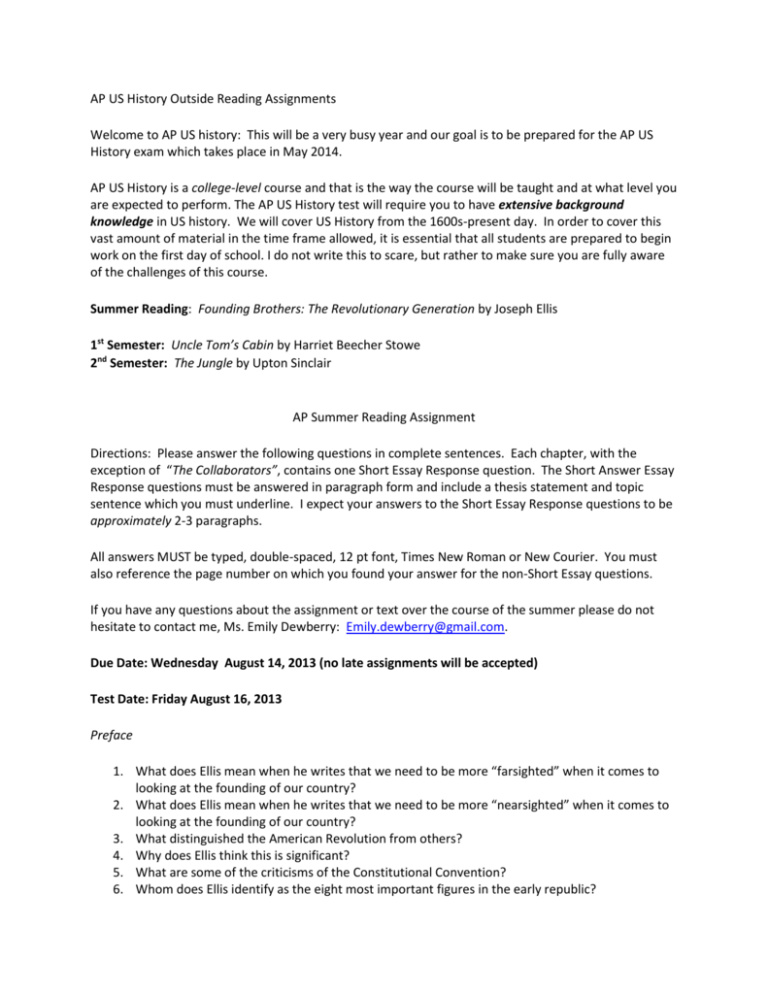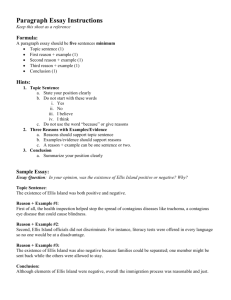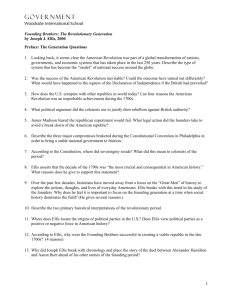AP US History Outside Reading Assignments Welcome to AP US
advertisement

AP US History Outside Reading Assignments Welcome to AP US history: This will be a very busy year and our goal is to be prepared for the AP US History exam which takes place in May 2014. AP US History is a college-level course and that is the way the course will be taught and at what level you are expected to perform. The AP US History test will require you to have extensive background knowledge in US history. We will cover US History from the 1600s-present day. In order to cover this vast amount of material in the time frame allowed, it is essential that all students are prepared to begin work on the first day of school. I do not write this to scare, but rather to make sure you are fully aware of the challenges of this course. Summer Reading: Founding Brothers: The Revolutionary Generation by Joseph Ellis 1st Semester: Uncle Tom’s Cabin by Harriet Beecher Stowe 2nd Semester: The Jungle by Upton Sinclair AP Summer Reading Assignment Directions: Please answer the following questions in complete sentences. Each chapter, with the exception of “The Collaborators”, contains one Short Essay Response question. The Short Answer Essay Response questions must be answered in paragraph form and include a thesis statement and topic sentence which you must underline. I expect your answers to the Short Essay Response questions to be approximately 2-3 paragraphs. All answers MUST be typed, double-spaced, 12 pt font, Times New Roman or New Courier. You must also reference the page number on which you found your answer for the non-Short Essay questions. If you have any questions about the assignment or text over the course of the summer please do not hesitate to contact me, Ms. Emily Dewberry: Emily.dewberry@gmail.com. Due Date: Wednesday August 14, 2013 (no late assignments will be accepted) Test Date: Friday August 16, 2013 Preface 1. What does Ellis mean when he writes that we need to be more “farsighted” when it comes to looking at the founding of our country? 2. What does Ellis mean when he writes that we need to be more “nearsighted” when it comes to looking at the founding of our country? 3. What distinguished the American Revolution from others? 4. Why does Ellis think this is significant? 5. What are some of the criticisms of the Constitutional Convention? 6. Whom does Ellis identify as the eight most important figures in the early republic? 7. What common themes does he argue their lives illuminate? (There are four) 8. Short Essay Response : What do you think is the most significant quote or line from this “chapter” and why? Be specific The Duel 9. How did the characters and the duel represent political developments of the early republic? 10. When Ellis refers to “the supercharged political culture of the early republic,” what does he mean? 11. Why did the duel matter? 12. What are some of the lingering questions about the duel between Hamilton and Burr? 13. Short Essay Response: Why do you think Ellis decided to put this chapter “out of order”? The Dinner 14. What was the dinner, who attended and what did they talk about? 15. Why did it matter? 16. What are some obstacles for each issue? 17. How does the Compromise of 1790 illustrate the disagreements among the leaders of the revolutionary era? 18. Short Essay Response: Why do you think it is important to focus on the issue of Compromise as key to the founding of America? Do you think Compromise is important in modern day politics? Give specific examples. The Silence 19. To what does “the silence” refer? How do the players in this chapter use God’s will? 20. What did the American Revolution mean for the institution of slavery? 21. According to proslavery forces, what practical impediments precluded abolition? 22. Find a copy of US Constitution and locate all the items relating to slavery. List them and where you find them. 23. Short Answer Essay Response: How would US history have been different if slavery had been outlawed after the revolution? Consider what you already know about the Civil War, Segregation, and Modern Day “race relations”. The Farewell 24. Why does Ellis think it is important in the history of the early republic? 25. What did the farewell have to do with foreign policy? 26. Identify each of the following: Jay’s Treaty, Whiskey Rebellion, and Shay’s Rebellion 27. How do they figure into the significance of the farewell? 28. What are some of the main points that Washington wanted to make in his Farewell Address? 29. Short Essay Response: Does this chapter serve to “humanize” the iconic status of George Washington? Why or why not? The Collaborators 30. How does Ellis argue these collaborators shaped the history of the early republic? 31. How did foreign policy figure into the collaborations and their significance? 32. What were the Virginia and Kentucky resolutions? What significance do they hold in the history of the early republic? The Friendship 33. What was the friendship? When was it formed? How did it change over time? Why 34. What significance for the history of the early republic does Ellis attribute to the friendship? 35. How did the friendship illuminate issues related to the meaning of the American Revolution? Put another way, what did the revolution mean to whom? 36. How did the dialogue, as it unfolded from 1812 through 1826, illuminate issues critical to the early republic? 37. Short Essay Response: Why do you think so many AP US History teachers assign this text? What do you think it shows or does not show about our Founding Fathers?






